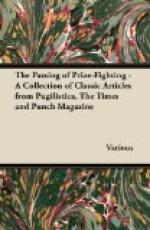[Illustration: A BRIGHT PARTICULAR STAR IN THE MILKY WAY.
Showing how an Angel without wings played on the harp to Milkmaid Tess of the Tubbyveals, who was so proud of her calves.]
Since THACKERAY’s Captain Costigan, and TOM ROBERTSON’s dramatic variation of him as Eccles in Caste, no more original type of the besotted, no-working working-man, has been given us ("at least, as far as I am aware,” interpolates the Baron, with a possible reservation) than Tess’s father, Durbeyfield. His foolish wife, Joan, kindly in a way, a fair housewife and helpmate, yet deficient in moral sense, is another admirably-drawn character.
The only blot on this otherwise excellent work is the absurdly melodramatic character of that “villain of the deepest dye,” Alec D’Urbeville, who would be thoroughly in his element in an Adelphi Drama of the most approved type, ancient or modern. He is just the sort of stage-scoundrel who from time to time seeks to take some mean advantage of a heroine in distress, on which occasions said heroine (of Adelphi Drama) will request him to “unhand her,” or to “stand aside and let her pass;” whereupon the dastardly ruffian retaliates with a diabolical sneer of fiendish malice, his eyes ablaze with passion, as, making his melodramatic exit at the O.P. wing, he growls, “Aha! a day will come!” or “She must and shall be mine!” or, if not making his exit, but remaining in centre of stage to assist in forming a picture, he exclaims, with fiendish glee, “Now, pretty one, you are in my power!” and so forth. ’Tis a great pity that such a penny-plain-and-two-pence-coloured scoundrel should have been allowed so strong a part among Mr. HARDY’s excellent and unconventional dramatis personae. Even the very, very strong ejaculations wherein this bold bad man indulges on the slightest provocation belong to the most antiquated vocabulary of theatrical ruffianism. However, there he is, and all the perfumes of the Vale of Blackmoor will not suffice for dispelling the strong odour of the footlights which pervades every scene where this unconscionable scoundrel makes his appearance. That he is ultimately disposed of by being stuck to the heart with the carving-knife that had been brought in for cold-beef slicing at breakfast, is some satisfaction. But far be it from the Baron to give more than this hint in anticipation of the tragic denoument. Some might accuse Mr. THOMAS HARDY of foolhardiness in so boldly telling ugly truths about the Pagan Phyllises and Corydons of our dear old Christian England; but we, his readers, have the author’s word for the truth of what he has written, as “the fortunes of Tess of the D’Urbevilles, a Pure Woman,” are “faithfully presented,” by THOMAS HARDY, and so his honour is pledged to the truth of this story which his powers of narration have made so fascinating to a host of readers besides the one who is a host in himself, namely,




